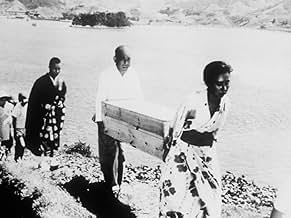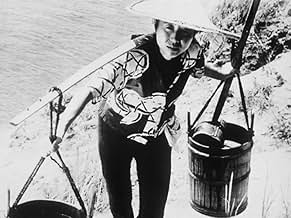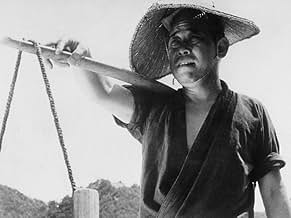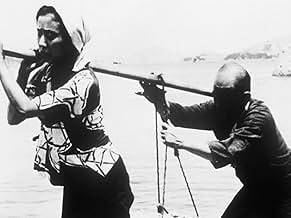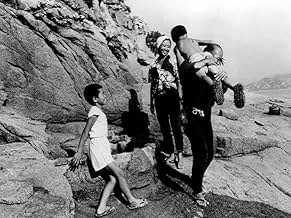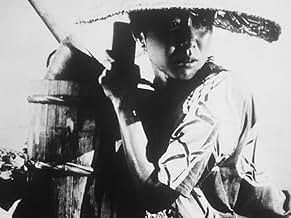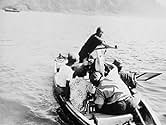AVALIAÇÃO DA IMDb
8,0/10
6,5 mil
SUA AVALIAÇÃO
Adicionar um enredo no seu idiomaA family of four are the sole inhabitants of a small island where they struggle each day to irrigate their crops.A family of four are the sole inhabitants of a small island where they struggle each day to irrigate their crops.A family of four are the sole inhabitants of a small island where they struggle each day to irrigate their crops.
- Indicado para 1 prêmio BAFTA
- 5 vitórias e 1 indicação no total
Avaliações em destaque
10ewc
If you have ever wondered what a film would be like that exemplifies how the tools of the craft can be used to do powerfully what no other art can do, this film answers the question. It is among the most carefully wrought, least encumbered yet profound movies ever made. The fact that it has long been unavailable in America and Europe in any accessible format reflects very sadly upon us all. (Addendum 15 March 2008 for those of you with region-free players: the English distributor, Eureka, has thankfully released the original widescreen version of the movie in PAL format in its 'The Masters of Cinema Series', #12, with an optional commentary by Shindo and his composer, Hikaru Hayashi. Available from Amazon.uk.)
10pzzz
I saw this 30 years ago -- I walked out then in awe, and it's been on the top of my list ever since.
I came to the internet searching for information on this movie. Not only did I find it, but I found a comment that mirrored my own experience with the movie. I too saw it in my student days, nearly 30 years ago, in a Friday-night "cinema" series in the student union theater. I see it's listed as B&W; I remember it in color -- maybe colorized it in my head? No dialog, just music and environmental sound; gorgeous photography of the island, the sea, the brutally hard work ferrying water for the crops on the terraces. And we follow that work for a long long time; we go through impressed, to irritated (why don't they move to town for chrissake), to rage at being made to sit through this for so long, to numb resignation. So we're right where the characters are. Writhing in my seat, hoping it will come to an end. And then the brief scene that left me stunned, that made sense of all that lead up to it, two seconds of film that explain us in the universe. Like William, I've never met anyone else who's seen this movie. And I don't know if I could sit through it again. But I'm sure glad I did back then.
Amazing! Let me join the happy few who saw this film when it first came out. It was in Paris. I was a student. It was L'Ile Nu I think. And I have never forgotten it and never seen it again. That's over 40 years ago! And now it is coming out on DVD and most people will never have heard of it. So my dear golden oldies who were young in 1961, rejoice and tell everyone. This is pure cinema with no frills, worthy of comparison with Dreyer, Bresson and O'Flaherty and a lovely companion piece to Shindo's ONIBABA. That onibaba grass stayed with us over the years as did that naked island. Talking of films lost but not forgotten, I can draw a comparison with MERE JEANNE DES ANGES (same subject matter as Ken Russell's THE DEVILS)which I saw in Leipzig in about 1962 and which I have never seen since. What a coincidence! That Polish film (MOTHER JOAN OF THE ANGELS)is also coming out on DVD. Real poetic cinema is trickling through the mishmash.
Okay, we have a loving tribute here, personal for director Kaneto Shindo as portraying the life of his parents. We have the rural hardship, and dogged persistence for live in a place where water is painfully hauled over a steep cliff, and we have the quiet cinematic language that describes it.
But also describes a life of simple pleasures. Shindo observes both closely, with sympathy.
The narrative thread of The Naked Island flows with the slow and dull repetition of life itself - if the movie is dull and monotonous it is because life is dull and monotonous and with a handful of fleeting moments of pleasure and joy scattered among the daily routine of making ends meet. In that sense, the artificiality that some reviewers have spoken of (certainly Shindo's decision to include no dialogues and the film almost silent save for a few natural sounds and voices) touches upon the heart of the thing.
The film follows the cycle of the seasons as the family tries to survive in the small island and it is by using the renewal of nature as a backdrop that Shindo draws emphasis on the periodic nature of life and time - the snake that eats its tail. The theme of renewal and the cycle of life and death is further symbolized through long, repetitious sequences of the man and wife transporting irrigation water in large buckets through the steep steps of a hillside and even further as Shindo ends the film cyclically with the same aerial shot that opened it.
The other major triumph for the great Japanese director is the visual language he employs to tell the simple and languidly paced story. This is probably a point that will only interest the avid film buff but I'm fairly sure it's that kind of person only that will seek out such a film anyway. The cinematography consists of full images, superb staging and framing of the (little is the truth) action, images as much beautiful in the subject they present as in the presentation of the subject itself and vibrating with honesty and clarity of vision. As with Kurosawa in DERSU UZALA, The Naked Island captures the essence of 'life as lived in' - the texture, the mood, the smell.
Combined with the symbolism he has carefully planted within the film, The Naked Island is a complete depiction of life on both macrocosmic and microcosmic levels. Of a very specific kind of life the truth is (rural life in a Japanese island in the 30's) but in the larger scheme of things and in the things that actually matter, what is true of one man is true of many.
In an age where directors are content to just wink at their audiences with a sense of smug satisfaction, presenting us with cynic and gimmicky films, swapping emotional catharsis for surprise 'twists', doing away with honest character portrayals in favour of decorating characters with random quirks, having forgotten visual storytelling in favour of redundant voiceovers, shaky cams or self-consciously, witty dialogue; in an age like this, The Naked Island seems to come from another planet, alien to the mentality and ethics of modern cinema as much as its bucolic subject matter is to modern city life. It's definitely not something that will appeal to most but those that will set out looking for it will not be disappointed.
But also describes a life of simple pleasures. Shindo observes both closely, with sympathy.
The narrative thread of The Naked Island flows with the slow and dull repetition of life itself - if the movie is dull and monotonous it is because life is dull and monotonous and with a handful of fleeting moments of pleasure and joy scattered among the daily routine of making ends meet. In that sense, the artificiality that some reviewers have spoken of (certainly Shindo's decision to include no dialogues and the film almost silent save for a few natural sounds and voices) touches upon the heart of the thing.
The film follows the cycle of the seasons as the family tries to survive in the small island and it is by using the renewal of nature as a backdrop that Shindo draws emphasis on the periodic nature of life and time - the snake that eats its tail. The theme of renewal and the cycle of life and death is further symbolized through long, repetitious sequences of the man and wife transporting irrigation water in large buckets through the steep steps of a hillside and even further as Shindo ends the film cyclically with the same aerial shot that opened it.
The other major triumph for the great Japanese director is the visual language he employs to tell the simple and languidly paced story. This is probably a point that will only interest the avid film buff but I'm fairly sure it's that kind of person only that will seek out such a film anyway. The cinematography consists of full images, superb staging and framing of the (little is the truth) action, images as much beautiful in the subject they present as in the presentation of the subject itself and vibrating with honesty and clarity of vision. As with Kurosawa in DERSU UZALA, The Naked Island captures the essence of 'life as lived in' - the texture, the mood, the smell.
Combined with the symbolism he has carefully planted within the film, The Naked Island is a complete depiction of life on both macrocosmic and microcosmic levels. Of a very specific kind of life the truth is (rural life in a Japanese island in the 30's) but in the larger scheme of things and in the things that actually matter, what is true of one man is true of many.
In an age where directors are content to just wink at their audiences with a sense of smug satisfaction, presenting us with cynic and gimmicky films, swapping emotional catharsis for surprise 'twists', doing away with honest character portrayals in favour of decorating characters with random quirks, having forgotten visual storytelling in favour of redundant voiceovers, shaky cams or self-consciously, witty dialogue; in an age like this, The Naked Island seems to come from another planet, alien to the mentality and ethics of modern cinema as much as its bucolic subject matter is to modern city life. It's definitely not something that will appeal to most but those that will set out looking for it will not be disappointed.
On a tiny island in the Seto Inland Sea, a small family consisting of husband, wife, and two sons, struggle to get by. They are the island's sole inhabitants, and spend their days fetching water from the mainland and carrying up the steep hill in order to water their crops. One day when the mother and father are away from the island, one of the sons falls ill, and the father races to get help. Their lives are all portrayed in painstaking detail, and the film contains no dialogue whatsoever. The film is directed by Kaneto Shindo, who directed the two brilliant Japanese New Wave horror films, Kuraneko and Onibaba, the only two other films of his I've seen.
This is a break in style and subject for Shindo. The two aforementioned horror films were similarly slow and detailed, but The Naked Island contains no action or atmosphere, but certainly shares their beauty. This is a film that shows how far humanity can be pushed in order to merely get by. The climax of the film (and I don't feel I'm ruining anything by revealing it, the story is not important) has their ill son dying, as his father and the doctor arrive too late. After the funeral, they are forced back to work. The mother, needing to grieve, throws down the water and screams into the ground, as the father watches helpless. Afterwards, she gets up, and methodically resumes watering.
Shindo tackles a universal subject with the neglect of the working class. Filmed with no dialogue, it emphasises their facial expressions and body movements in a way the silent era did, and forces the audience to live through the work they do, every step at a time. The director said he wanted to "capture the life of human beings struggling like ants against the forces of nature," and he certainly does that. The film is slow, and focuses a lot of time on the struggle of carrying the water up the hillside. Yet it's filmed with such elegance, it only hammers their struggle home. This is a beautiful and moving film, that is almost brutal in its relentlessness.
www.the-wrath-of-blog.blogspot.com
This is a break in style and subject for Shindo. The two aforementioned horror films were similarly slow and detailed, but The Naked Island contains no action or atmosphere, but certainly shares their beauty. This is a film that shows how far humanity can be pushed in order to merely get by. The climax of the film (and I don't feel I'm ruining anything by revealing it, the story is not important) has their ill son dying, as his father and the doctor arrive too late. After the funeral, they are forced back to work. The mother, needing to grieve, throws down the water and screams into the ground, as the father watches helpless. Afterwards, she gets up, and methodically resumes watering.
Shindo tackles a universal subject with the neglect of the working class. Filmed with no dialogue, it emphasises their facial expressions and body movements in a way the silent era did, and forces the audience to live through the work they do, every step at a time. The director said he wanted to "capture the life of human beings struggling like ants against the forces of nature," and he certainly does that. The film is slow, and focuses a lot of time on the struggle of carrying the water up the hillside. Yet it's filmed with such elegance, it only hammers their struggle home. This is a beautiful and moving film, that is almost brutal in its relentlessness.
www.the-wrath-of-blog.blogspot.com
Você sabia?
- Curiosidades'Hadaka no shima' was made, in the words of its director, "as a 'cinematic poem' to try and capture the life of human beings struggling like ants against the forces of nature."
- ConexõesReferenced in Century of Cinema: Nihon eiga no hyaku nen (1995)
Principais escolhas
Faça login para avaliar e ver a lista de recomendações personalizadas
- How long is The Naked Island?Fornecido pela Alexa
Detalhes
Bilheteria
- Faturamento bruto mundial
- US$ 14.673
- Tempo de duração1 hora 36 minutos
- Cor
- Mixagem de som
- Proporção
- 2.35 : 1
Contribua para esta página
Sugerir uma alteração ou adicionar conteúdo ausente




